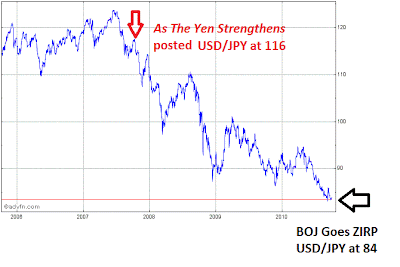Economists are forever trying to come up with theories to explain unemployment and wages. It is always a "hot" topic, and the Bureau of Labor Statistics (BLS) monthly release on the employment situation is arguably the one statistic which can - and does - move markets most.
I won't go into the various economic theories on how wages, unemployment and inflation all come together to shape (or "clear"), the labor market. I have a more fundamental question, instead: How important are wages in today's economy, overall? Or, to put it more precisely, how come we have allowed gainful employment and earned income to become so unimportant?
The following chart shows that wages and salaries as a percentage of GDP have been dropping steadily for 40 years, from a high of 54% of GDP in 1970 to a low of 43.5% this year (see chart below). Including other forms of compensation like pension and medical benefits does not alter the picture appreciably: total compensation of employees went from 60% of GDP in 1970 to 54% this year.
Simply put, then, working people are getting a smaller slice of the economic pie.
Yeah, The Pie Is Bigger But Your Slice Is Smaller
This is as major of a transformation of the economy as it gets but it is almost never discussed by academic economists, who are forever trying to figure out how to model unemployment, or interest rates, or whatever econometric datum strikes their fancy. It's like pondering the price of candle oil while Rome burns. And they get Nobels for it, too!
(A small aside about the Nobel Prize for economics: it was not part of Alfred Nobel's will in 1895. It was instituted and funded much later, in 1969, by Sweden's central bank; it is formally known as the Sveriges Riksbank Prize in Economic Sciences in Memory of Alfred Nobel. Considering its provenance in the depths of Money Central, it's highly unlikely that a more "radical" economist is ever going to be awarded one. )
Anyway, who's been eating the
Peoples' Slice Of The Pie (TM) then?
Is it proprietors of small businesses or farms? Hardly. Their income as a share of GDP was 8% in 1970 and it's still around 7% today.
For a clue, look at the following chart of net dividends as a percentage of GDP: they have steadily climbed over the years and literally soared after 2003 to nearly triple what they were in the 70's.
If stock ownership was even somewhat evenly distributed amongst Americans I would have no real problem with this picture. But, it isn't - not by miles and miles. The richest 10% families owned in 2007 a mean $700,000 worth of stocks, while the next 15% owned a mere $53,000. The rest, i.e. 75% of the people, owned next to nothing at all
(see chart and table below).
The United States, indeed the entire West, has in recent times been transformed from a society defined by the constructively paired
work-income relationship, to one oriented towards an
asset-debt pair. Even worse, most assets are now owned, controlled and exploited by an ever-shrinking minority of super-rich, forcing the vast majority of the people into virtual debt slaves. That's what
Virulent Capitalism is all about, in my opinion.
But does anyone really give a hoot? Are important economists really screaming bloody murder? Are politicians really taking notice? The short answer is no.
Notice my main recommendation on the right:
Animal Spirits is an excellent book authored by George Akerloff and Robert Shiller, two economists who hardly fit the classical model. For example, they make mincemeat of the deeply-ensconced theory that humans are constantly acting in their so-called "rational" self interest when they make economic decisions. Akerloff ans Shiller are willing - and scientifically able - to tear down the entire foundation upon which classical economics has been resting for centuries.
And yet...
Whilst they correctly identify the causes of the current crisis and properly point accusingly to all the proper directions, what is it that they recommend as a solution? That the Fed should target credit expansion, i.e. make as much
credit available to the economy as possible. Not a word about the huge deficit in earned income, not a peep about the enormous asset ownership gap. Instead, more credit, more debt for the masses.
Sorry guys, that's plain insane.
Don't get me wrong. Animal Spirits is an otherwise excellent book, well worth reading for its spirited departure from classical metrics-based economic theory. Buy it, read it, profit from it. But, my point here is that even such forward-thinking economists atavistically fall back to old remedies when faced with financial crises. It's like a modern day doctor correctly diagnosing TB and then prescribing a long stay in a Swiss mountain sanatorium as a cure. Well, good luck with that...
(Maybe it's because Akerloff's wife is none other than Janet Yellen. Yup, maybe he's being very rational, after all. From a personal peace-in-the-family standpoint, of course. Eh...)
P.S. This post was written during the weekend, so I should seriously consider testing myself for ESP because the
Nobel committee just announced its choices for the aforementioned Economics prize - and guess what? They gave it to three economists for their work on unemployment, job vacancies and wages.
Same old, same old unfortunately.





